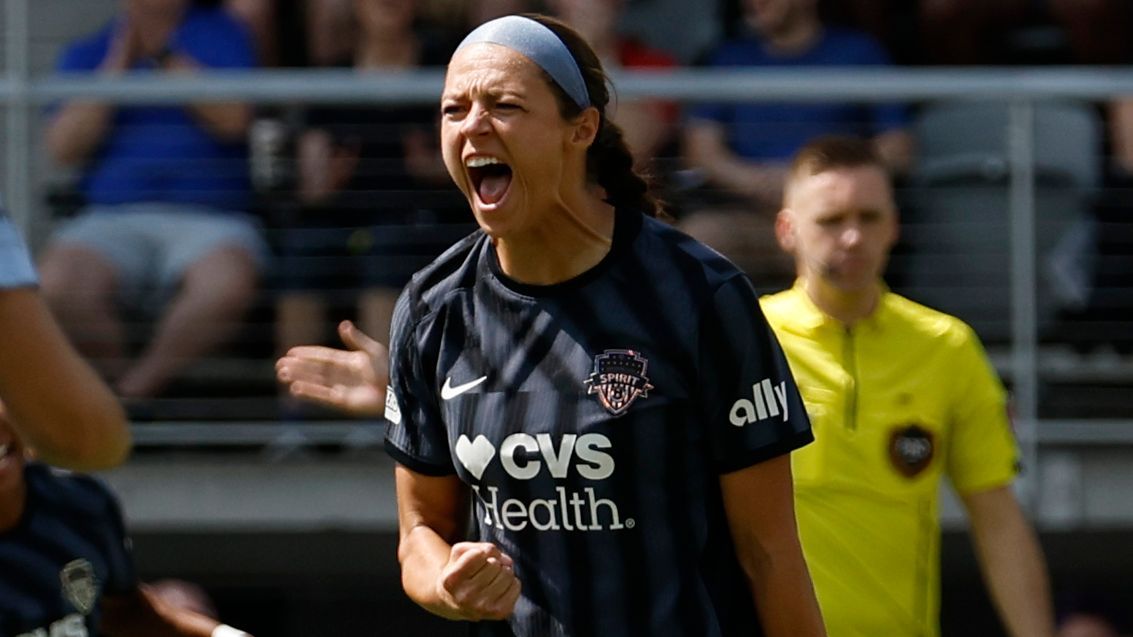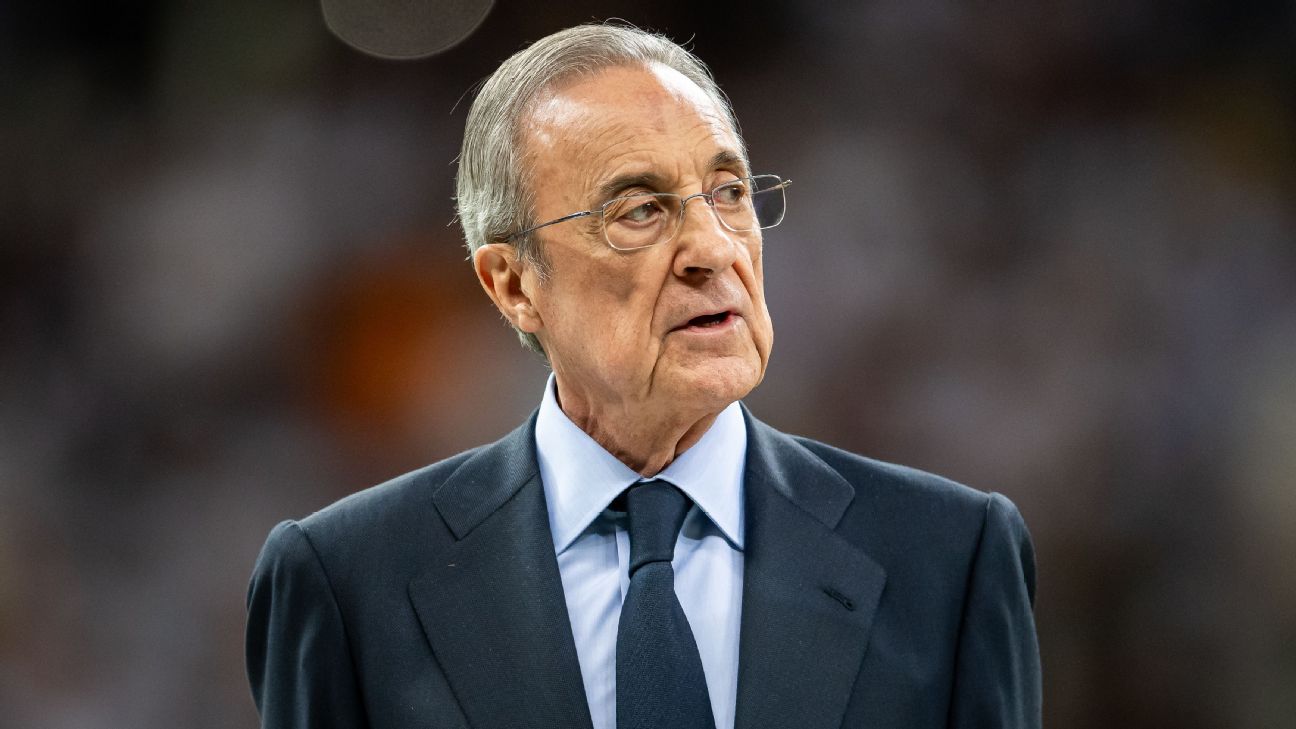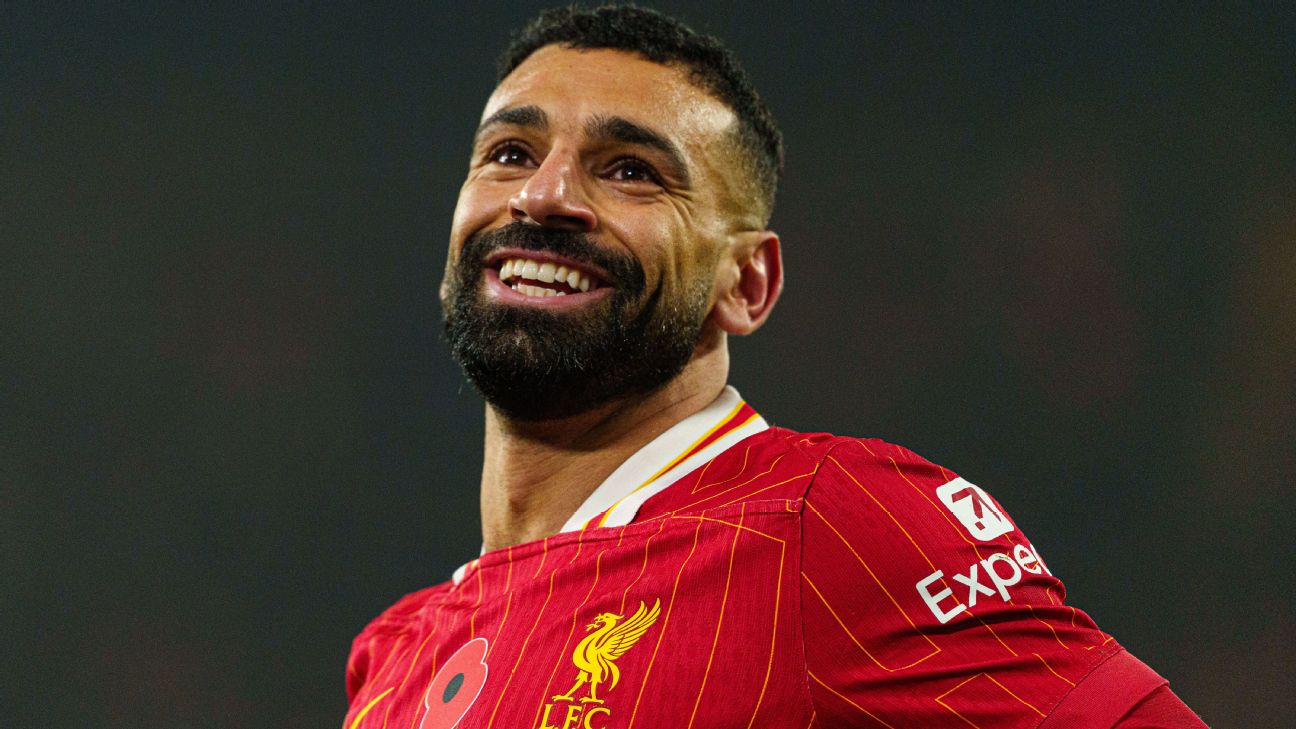Ashley Hatch was — and to be clear, still is — chasing the dream most American women’s soccer players have: to represent the United States at a World Cup or Olympics.
Achieving that goal was within reach just over a year ago, until that chapter suddenly ended. Hatch was a regular with the national team in the two years leading up to the 2023 World Cup. She was, at one point, competing with Alex Morgan for the No. 9 role on the USWNT. Hatch traveled to New Zealand with the team at the start of 2023 for what was treated as a dry run of the World Cup and played in five of the seven games that year before the roster announcement.
Then came the call in June from Vlatko Andonovski, USWNT head coach at the time: Hatch was not on Andonovski’s 23-player list for the World Cup.
“Last year was probably one of the most difficult years in my career,” the 29-year-old told ESPN.
Hatch, who plays for the National Women’s Soccer League’s Washington Spirit, has rarely discussed those moments, and that decision, publicly. Many casual fans might recognize her story as a common form of heartbreak in sports as athletes fight for selection and playing time. However, her tale is about more than one roster decision, and it is illustrative of a wider trend in women’s soccer in which players can assemble spectacular careers for their clubs regardless of their status internationally.
Being a great professional player matters now. That is a marked shift in the landscape as women’s soccer, led by the NWSL, continues to grow in about every metric on and off the field.
A league that means a lot (more)
The NWSL was founded in late 2012 with a clear objective from U.S. Soccer: The league would exist to give USWNT players regular competition on home soil. The previous league (WPS) had just folded, and the professional game was at another crossroads with no viable league in operation. Players spent that 2012 Olympic year training locally and playing games with amateur teams when they weren’t with the USWNT.
For years, the hierarchy in the NWSL was clear: The national team was what mattered. That was the private stance of the federation, which operated the NWSL, and it became a general mindset for many players.
Meanwhile, those on the fringes competed to earn an international call-up. Plenty of them gave up on the chase as it eluded them, or as injuries piled up, for minimal compensation. Without hope of a call-up or the dream of a World Cup, playing as a quasi-professional for low pay wasn’t worth it.
Regular starters for the USWNT began planning their lives around the national team, frequently taking extra time off from their NWSL clubs before and after international tournaments. The most extreme example came in 2015, when legendary forward Abby Wambach skipped the NWSL season entirely ahead of the World Cup.
The NWSL was a conduit for players to get to the USWNT, where more money and the ultimate dream might await.
Those dynamics have changed in recent years. U.S. Soccer stopped serving as manager of the NWSL in 2021, leaving clubs and the league office to prioritize themselves in decision making. Two successive collective bargaining agreements have established living wages and minimum standards in the NWSL. Gone are the $6,000 minimum contracts from 2013 (yes, that was the pay for the entire season). The minimum salary will rise to $82,500 by 2030, while top players in the NWSL now make around half a million dollars annually.
Being a somebody in arguably the best women’s league in the world now means something in and of itself, even if it is not accompanied by World Cup glory.
“You always dreamed and hoped for it — you just never really knew how long it was going to take to get there,” Hatch’s Spirit teammate, Nicole Barnhart, told ESPN about the NWSL’s growth.
Barnhart turns 43 in October and has played in the NWSL since the league’s inception. “And, you know, honestly, as a player coming into this league a little bit later in my career, I never knew if I was going to personally get to experience that as a player.”
Hatch scored a brace earlier this month against the Houston Dash to reach 50 career NWSL goals. She is only the seventh player in league history to reach that mark. She has scored most of those goals as a poaching striker, but this year, under new Spirit head coach Jonatan Giraldez, Hatch has had to learn how to play as a winger and a pocket player underneath the forward. The move has taken her farther away from the goal and her comfort zone.
Still, 50 career goals, on top of a Golden Boot and NWSL title in 2021, puts Hatch in rare company. She is surrounded by stars on a Spirit roster headlined by Trinity Rodman, but Hatch is a case study of how a successful NWSL career can and should mean something, the same way an NBA legend can be celebrated without wondering if they have an Olympic gold medal.
Futbol W’s Jeff Kassouf believes Washington Spirit will struggle for the remainder of the season if they’re missing Trinity Rodman.
Increasingly, there are more women’s soccer players like Hatch putting together memorable professional careers. In the aftermath of her international heartbreak, Hatch has embraced her role as one of the Spirit’s longest-tenured players.
“When people look back on my career, I want them to be able to say like, ‘Oh my gosh, she was an amazing player. She did so many things for the Spirit,'” Hatch said. “If the national team is in that conversation, great; if not, [it’s not].
“‘Also, off the pitch, she impacted her community. She was a very nice person. She moved the game forward.’
“That’s what I want people to say. And when they continue to focus on those things, some people will only care about the national team, and that’s fine. But this league is amazing, and there’s so many amazing players, so I think it would be silly if we didn’t focus on that as well.”
Separating present disappointment from defining a player
The 48 hours after Andonovski’s phone call were probably the worst for Hatch.
She and Mark Parsons, who was head coach of the Spirit at the time, agreed that Hatch should take the day off from training following the news. Four of her Spirit teammates had made the 2023 World Cup team, and as much as Hatch needed time to process her situation, she wanted her Spirit teammates to celebrate and be celebrated.
Barnhart empathized. She is the oldest player in league history and a two-time NWSL champion. She is a two-time Olympic gold medalist as a backup to Hope Solo in 2008 and 2012, though Barnhart never played in those tournaments. Her international career ended somewhat abruptly over a decade ago as the USWNT transitioned its goalkeeper pool.
Hatch and Barnhart did not have to speak in detail about what happened last year. Barnhart knew what Hatch was going through.
“Once you get over that initial shock of [getting cut], and kind of control your emotions a little bit, you get back in with a team, you start to get over it a little bit,” Barnhart said. “But then you’re dealing with everybody kind of asking how you’re doing so I think it’s kind of a lot of roller-coaster emotions as you’re trying to deal with it through that process. And I think that’s hard, but she handled it like an absolute professional.”
Handling it the way she did was a product of Hatch building a foundation of mental fortitude.
In 2019, she connected with Matt Moore, who is an assistant professor at the University of Utah and specializes in sports psychology. He is also the cousin of Hatch’s husband, Jeff. Hatch, Jeff, and Moore had dinner after a Spirit game in 2019, and the mental coaching partnership was formed. (The new NWSL CBA has broadened mental health services to provide more support to players league-wide, including rights to mental leave.)
Moore also works with athletes as a mental performance coach, providing them with tools to improve self-awareness and further self-discovery. His approach is multi-pronged, focusing in layman’s terms on maintaining perspective and developing self-confidence.
“The goal is never to get rid of these thoughts, to get rid of the emotional experience,” Moore told ESPN. “It’s just simply to change your relationship with them. How do you relate to your thoughts and how do you relate to your emotional experience? In my mind, and in our pursuit of working together, that was the goal.”
Hatch has used some of these methods to put her 2023 in perspective. She reminds herself of all that she has accomplished and speaks to herself with grace (verbal persuasion, as Moore calls it). Ultimately, missing out on the World Cup came down to one coach’s opinion.
Religion is also a cornerstone of Hatch’s life. She grew up in a Mormon family in Utah and attended BYU before turning pro. Her faith, she said, helped her through those moments last year when she felt she didn’t have the strength to do it herself.
“I feel like those prayers were answered through the people around me,” Hatch said, listing off her family and friends while noting more innocuous encounters. “I was really lifted up by the people around me, even just random strangers I didn’t know sending me nice messages of encouragement or people after games who I didn’t know [would say], ‘Hey, we still think you’re amazing. Keep going.'”
Hatch has kept going. Earlier this year, she signed a multiyear contract extension with the Spirit, forgoing the opportunity to be a free agent. With the option year, she could be with the club through the 2027 season.
Washington, D.C. has become home since she was traded to the Spirit nearly seven years ago. She loves the team’s ambition, guided by owner Michele Kang’s dream of a multiclub global network and exemplified by luring Giraldez away from European champion Barcelona. Washington sits second in the NWSL table and has a realistic shot of winning another NWSL championship this fall.
Poetry has also become an occasional form of release for Hatch through her work with DC Scores, a local organization that empowers youth in need throughout the city using soccer, poetry and service.
Last year, Hatch stood on the stage for the first time (with Spirit teammates in attendance) to read a poem she had written about how she’s known for being an intense professional soccer player, but she is quiet and reserved off the field. Her profession does not define her, and neither does the disappointment of missing the 2023 World Cup.
There are harder days than others when the feelings come rushing back, she admits, but she works through it with her husband, family, teammates and Moore. Hatch and Moore now co-host a weekly podcast about mental performance and frequently welcome athlete guests to discuss their journeys.
Hatch is 29, and the next World Cup is three years away. She, like so many Americans, would welcome another invitation to USWNT camp, but she isn’t living for that moment. She is one of the leading scorers in NWSL history and with any luck, she has several more good scoring years ahead of her in her prime. That, especially in 2024, when the NWSL has entered mainstream consciousness, carries significant weight.
“I’m a firm believer in a lot of life is what happens to you, but it’s also how you react,” Hatch said. “I would like people to remember how I reacted to it. It wasn’t just powering through. Maybe from the outside perspective it looked like it, but it took a lot of conversations, a lot of self-reflection, and a lot of understanding from teammates and coaching staff.”



